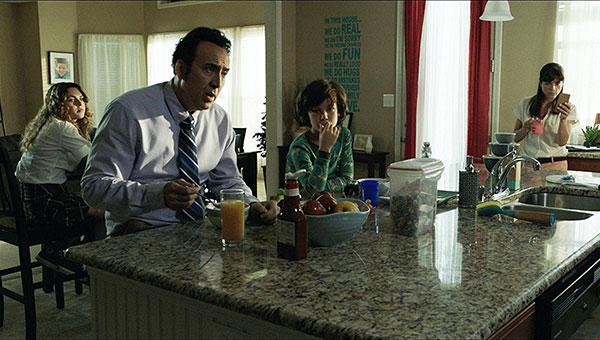Mom And Dad Review

The interweb was abuzz with excitement when the trailer landed for Mom and Dad, released in cinemas this week.
Then I realised it was mainly footage of Nicolas Cage acting crazy. Which seemed to be about as much a revelation as water being wet.
But I need not have feared for a lack of originality in Brian Taylor’s latest work. If it’s one thing, it’s original.
The film focuses on the Ryans, a typical American family: Dad Brent (Cage) is unfulfilled at his office job; Mum, sorry, Mom Kendall worries she’s losing her connection with daughter Carly; and Carly is a rebellious teenager often irritated by younger brother Josh.
The opening scene, as the family is having breakfast, preparing for the day ahead and generally bickering, is fraught with an underlying tension. You just know something bad is going to happen.
Carly is later hanging out at school with her friend Riley, when an angry mob of police and parents show up. It quickly becomes clear that the police are in fact on hand to protect the children from the parents.
One kid, amidst the confusion, climbs over the school fence only to be instantly massacred by his own folks.
Sounds gruesome? It is. But the tone is actually one of jet black comedy, admittedly not to everyone’s taste. This won’t be a surprise to fans of writer-director Taylor, who is probably most famous for 2006’s Crank.
This film shares the same manic energy and boundary-pushing sense of humour.
As the story unfolds, we learn that something is making the parents act in this erratic fashion, and it isn’t long before Brent and Kendall succumb. Which, as you can imagine, doesn’t bode well for Carly and Josh.
Cage and Selma Blair, as the titular parents, have clearly thrown themselves into their roles and are having fun. And Anne Winters and Zackary Arthur are strong as the two kids, who you initially find annoying and a bit bratty, and end up rooting for.
Lance Henriksen also shows up and participates in one of the film’s craziest sequences.
Taylor is not the kind of filmmaker to follow the rules, and you can forgive the odd lapse in linearity, but there are quite a few oddly-placed flashbacks which at times confuse the chronology of events.
The other main criticism which could be labelled at the film is its premise. Any sort of close examination of the subject matter will disturb even the strongest-stomached of gorehounds. After all, filicide is not ground on which many writers generally tread, even in a darkly comic way.
For those who are attuned to Taylor’s style and can take the film in the comic way it is intended, this is sure to please.
For everyone else, one thing is undeniable: Taylor’s vision is unique.
Conor Brennan